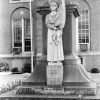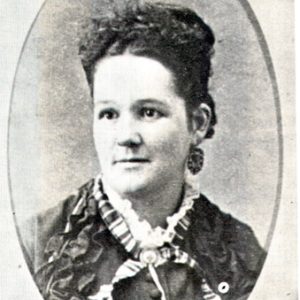calsfoundation@cals.org
Emily Weaver (?–1917)
Emily Weaver of Batesville (Independence County) was a young woman who found herself caught up in the unorganized Civil War legal apparatus. Though charged by the Union as a spy and sentenced to hang, her case was eventually dropped for insufficient evidence.
Emily Weaver was born to Abram Weaver and Mary Burton Weaver in Chester Valley, Pennsylvania. No birth date for her is given. In 1859, she, her mother, and six of her seven brothers moved to Batesville to be near relatives while Weaver’s father and oldest brother stayed behind to finalize business affairs for an eventual relocation to Memphis, Tennessee. The family stayed at Ninth and Main streets in a house she called “Pleasant Hill.”
Weaver’s family was divided, as were many, by the coming of the Civil War in 1860. Her father, a staunch Unionist, joined as an officer in the Union army in Pennsylvania, while her three older brothers enlisted in the Confederacy. Weaver, her mother, and remaining brothers resided in Batesville throughout the first two years of the war without much incident, other than Weaver and her cousins visiting with the officers on Confederate general John Sappington Marmaduke’s staff.
In May 1864, Weaver intended to travel to Memphis to visit her father, who had quit the army and set up his business there as planned. The rivers in eastern Arkansas were swollen by spring floods, so she was forced to travel overland to St. Louis, Missouri, and then take a river boat south to Memphis. Accompanying Weaver were her young cousin Charles Burr; a war widow named Eleanor Ann Keithly King, whom Weaver had befriended in Batesville; and a young ex-soldier named Lee Tilley, who had left the Confederate army and gone to work for Weaver’s uncle, Edwin Burr, in late 1862 or early 1863. The group arrived in St. Louis on June 5. Charles Burr went to school, but Tilley had business to attend to before he could accompany Weaver to Memphis. So Weaver and King, along with Laura B. Lingow (whom they met in St. Louis), went to stay with King’s father-in-law in Rolla, Missouri.
In Rolla, King was suddenly seized and placed under military arrest by the Federal army. Weaver and Lingow returned to St. Louis to stay at Lingow’s home until they could find out King’s situation. On June 20, Weaver was also arrested by two civilians (presumably detectives) and a squad of Federal soldiers and taken to the Female Military Prison in St. Louis. Weaver was not told why she was being arrested or what she was being charged with.
Meanwhile, Weaver’s uncle, Edwin Burr, had also gone to Memphis to visit Weaver’s father, who was very distressed over a letter he had received from Weaver detailing her arrest and imprisonment. Burr left immediately, arriving in St. Louis on July 25, and solicited the legal help of long-time friend and attorney H. F. Fairfield. Since her arrest, Weaver had been questioned only once and still did not know why she was being held. On August 2, she was formally charged with being a spy after her cellmate, Mary Ann Pittman, testified that Weaver had told her as much. She was sentenced to hang. On August 15, Burr was also arrested, presumably under suspicion of also being a spy, but he managed to secure his release after writing to military friends in the Union high command.
Weaver’s father arrived in St. Louis in late September. By then, his daughter’s case seemed to be going well as the prosecution had no material evidence linking her to the charges, and sordid details of Pittman’s past cast doubt on her testimony and credibility. But then Weaver and her new cellmate, Missouri Woods, escaped from the prison using a skeleton key. Because of her escape, Weaver’s father and uncle were placed under arrest on September 25. Burr was able to again secure his release with the help of influential friends. Weaver’s father, however, was not released until November 9, when Weaver’s case was dropped, despite her escape, due to inconclusive evidence.
Missouri Woods went to Canada, and Weaver eventually made her way back to Batesville in late 1864 or early 1865. The details of what happened to her after her escape are not known, but on December 20, 1866, she married Isaac Newton Reed, another employee of her uncle, and the couple made their home in Batesville. They had twelve children and resided at 590 East Main Street, known today as the Kennerly House.
Weaver died on August 5, 1917, and is buried at Oaklawn Cemetery in Batesville.
For additional information:
Crowley, W. J. “The Ordeal of Emily Weaver.” Independence County Chronicle 17 (October 1975): 1–45.
Case Miner
University of Arkansas, Fayetteville
 Women in the Civil War
Women in the Civil War Emily Weaver
Emily Weaver 




Comments
No comments on this entry yet.